Introducing equal parental leave between fathers and mothers can help reduce the gender pay gap in Malaysia, a United Nations official has suggested.
Speaking at an online forum, UN Population Fund (UNFPA) Malaysia assistant representative Tengku Aira Tengku Razif said the country's laws currently provide for a 98-day maternity leave, while men only get seven days paternity leave.
Citing the parental leave model employed in Europe, she said the countries there enforced equal leave allocation between fathers and mothers and it has proven to benefit women and their children.
"If there is compulsory allocation, then fathers and mothers would both have to take up leave. This has shown to be evident in, for example, European countries to be beneficial.
"Fathers and their children have better relationships. So as a family, the child's well-being is improved.
"It has also benefited women in terms of reducing their gender pay gap. By evidence, this has worked so far in European countries," she said.

Aira was one of the panellists in an online forum called 'Malaysia Women & Girls Forum (MWGF) - The Review' aired on UNFPA Malaysia Facebook earlier today.
She was answering a question posed by host Tehmina Kaoosji on the impact of the disproportionate imbalance between maternity and paternity leaves on women's employment in Malaysia.
In March last year, the Dewan Rakyat passed amendments to the Employment Act 1955, which included an increase in paternity leave from three to seven days, and an increase in maternity leave from 60 to 98 days.

However, according to Aira, the imbalance between leave given to fathers and mothers shows that the country is still under the assumption that the majority of the burden in raising children should be placed on women.
On the same note, her co-panellist Lee Min Hui from the Institute of Strategic and International Studies (ISIS) suggested the government also employ a more sustainable mode of financing parental leaves.
She said a recent study showed that many employers now prefer to hire men over women due to the extension of maternity leave.
This, according to Lee, was because employers have to bear the full costs when their employees go on maternity leave.
"...we really need to think of a more sustainable mode of financing parental leaves. We do not want things like unintended consequences like discrimination to crop up.
"So, really what Malaysia needs to consider is tripartite funding. We share the cost of parental leave across the government, across employers, and across employees themselves through social or employment insurance," she said.
Meanwhile, former deputy minister in the Prime Minister’s Department (law and institutional reform) Ramkarpal Singh suggested that Article 46 of the Federal Constitution be re-examined, to consider enforcing a certain percentage of women's representation in the Dewan Rakyat.

Speaking in a pre-recorded interview featured in the forum, he agreed that greater representation of women in politics should be encouraged but pointed out there are certain challenges.
"When we talk about politics, it is a bit different because... the composition of the Dewan Rakyat, for example, really depends on the outcome of the elections.
"We have Article 46 of the Federal Constitution which sets out the composition of Parliament. But it does not state how many percent should be women or so on.
"So, if at all, that particular provision, Article 46, would have to be examined to see whether or not it can be amended to accommodate a percentage of women," he said.
Female candidates
According to a note by the organiser, the interview with Ramkarpal was done before a recent cabinet reshuffle, which saw him dropped as a deputy minister.
The Bukit Gelugor MP also believed that a better option to increase women representation in political offices is to encourage political parties to come up with policies of having a minimum number of female candidates.
"If they win, obviously, it would increase the number of female participants in politics.
"I think that might be a better option which, of course, would need to be studied further," he said. - Mkini




No comments:
Post a Comment
Note: Only a member of this blog may post a comment.